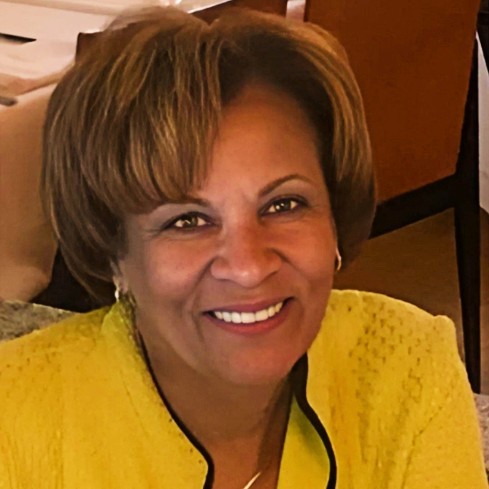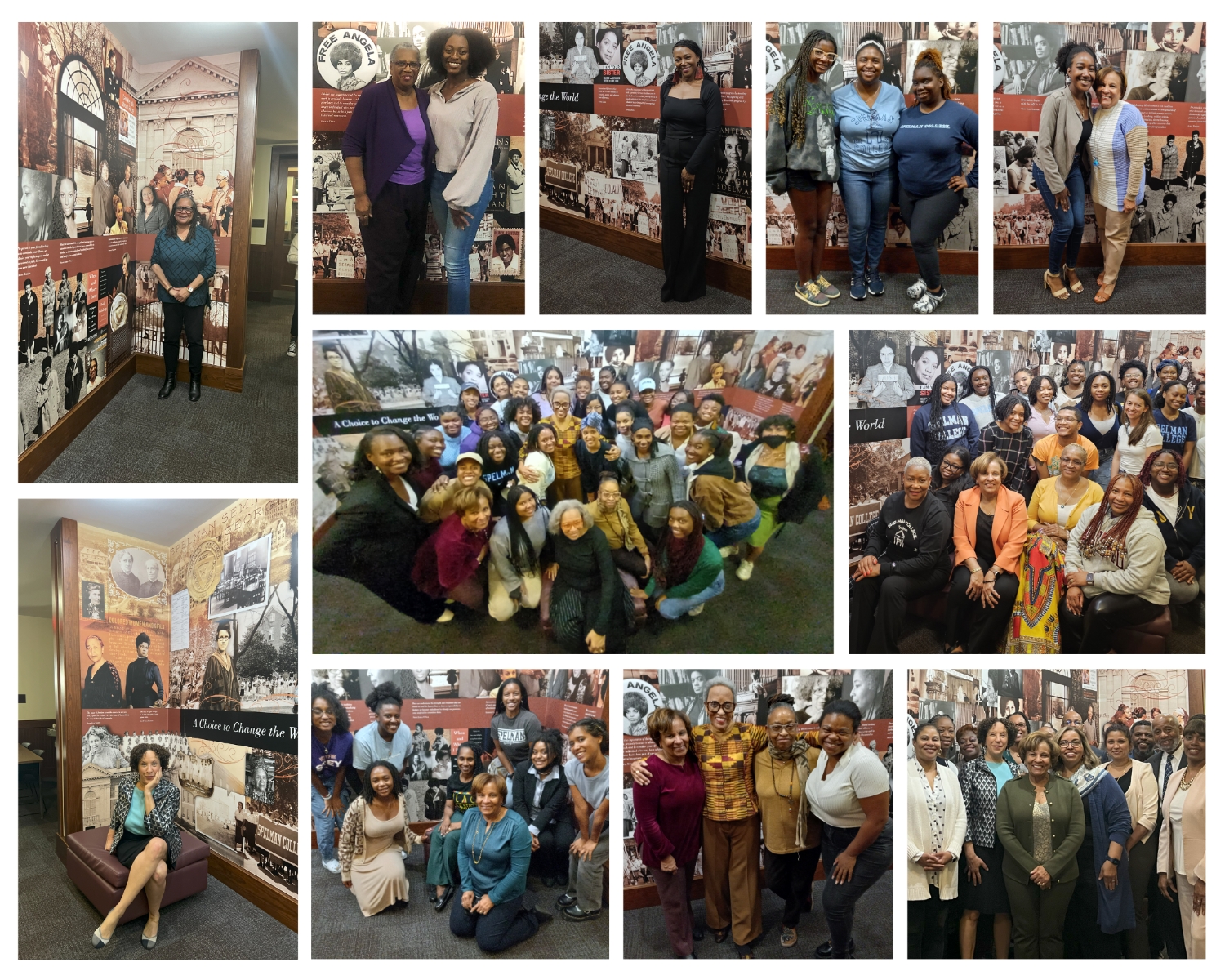"Who's Actually Behind the Door?": Spelman's Social Justice Leader Teaches Students to Interrogate AI
Dr. Cynthia Neal Spence Isn't Asking if AI is Coming. She's Asking Whose Rights will it Violate — and Training the Next Generation to Stop it.
 Spence, C'78, associate professor of sociology, has a question that should make tech companies uncomfortable: "Who's actually behind the door?" As founding director of the Spelman College Social Justice Program and director of the UNCF Mellon Programs, Spence isn't interested in whether artificial intelligence is useful. Of course it is. She is interested in something more urgent: Who's feeding information into the systems that make predictions about our lives?
Spence, C'78, associate professor of sociology, has a question that should make tech companies uncomfortable: "Who's actually behind the door?" As founding director of the Spelman College Social Justice Program and director of the UNCF Mellon Programs, Spence isn't interested in whether artificial intelligence is useful. Of course it is. She is interested in something more urgent: Who's feeding information into the systems that make predictions about our lives?
Whose rights are being violated in the process? And most critically — how do we train young Black women to sit at tables where these decisions are made and ask questions
no one else is asking?
The Algorithms of Oppression
Spence invokes Safiya Noble's groundbreaking work "Algorithms of Oppression" as both warning and roadmap. Noble documented how search engines, recommendation systems, and AI tools are "embedded with sexism, with racism, with classism, you know, with all kinds of isms that have to be interrogated."
The examples are everywhere. In criminal justice, AI enables targeted surveillance and predictive policing that disproportionately impacts Black communities. In healthcare, algorithms trained on biased data predict that Black patients need less pain medication or are less likely to benefit from certain treatments. In hiring, resume-screening tools filter out qualified candidates based on patterns that encode historical discrimination.
"When we think about technology, who's actually behind the door?" Spence asked again, driving the point home. "Whose rights of privacy are being violated?"
These aren't hypothetical concerns for her students. They're preparing to enter fields—healthcare, criminal justice reform, environmental justice, voting rights advocacy—where AI is already reshaping how power operates.
The Gray Areas
In Spelman's social justice residence hall, students grapple with complexity. They understand AI isn't leaving. They also understand it's not neutral.
"We talk about, for instance, you know, where are the gray areas?" Spence explained. "We understand that AI is important. We understand that it is not leaving us, but we also understand...that algorithms are embedded with sexism, with racism, with classism."
The conversations get specific. How much information is too much information when AI systems promise to predict health outcomes? How do you balance the potential benefits of data-driven policing against its documented harms? Who decides which communities are "digitally invisible," as scholar Nicol Turner Lee documents?
"How will this affect Black women? How will this affect Black men? How will it impact individuals who are on the margins of society—individuals who have access to health care, who don't have access to health care?" Spence pressed. These questions must be posed from an intersectional lens — always.
A Legacy of Innovation for Liberation
Spence speaks with the authority of someone who came through Spelman's garden and now tends it. A Spelman graduate herself, she studied under mentors like Dr. Diana Danner (now Dr. Diana Refsland), who introduced her to quantitative reasoning and using statistics to tell the stories of marginalized people.
"I come from a family of Spelman," she said with evident pride. "My mother, my sisters, my sister-in-law. So we're Spelman people."
That lineage matters. Spelman has always been seen as a space for developing young Black women who care — and who are trained to turn that care into action.
"We have historically innovated for the sake of our own liberation," Dr. Michelle Hite observed during their podcast conversation, and Spence embodies that tradition. Her teaching is animated by a question she learned as a child from parents who grew up through segregation: How will this impact my community?

Training the Disruptors
Spence's vision is uncompromising: HBCUs must be at the forefront of technological education, but always with a justice orientation.
"HBCUs must make certain that we're providing research opportunities for our students, absolutely internship opportunities for our students. But all of that, we cannot divorce ourselves from making certain that our students, when they're engaging and when they're being trained to become the leaders in technological fields, that they always have a lens toward making certain that they don't become a part of the problem."
She paused for emphasis: "That they don't become a part of the problem where you're perpetuating inequalities through the application of technological advances."
It's not enough to get Spelman women into tech companies and boardrooms. They need to arrive with questions that change the conversation.
The Five-Year Vision
When asked what Spelman's legacy in social justice and AI will be in five years, Spence doesn’t hesitate.
"I think they'll be saying, 'Here they go again. Those Spelman women are at, you know, in leadership positions in the area of technology, and they're asking questions that have never been asked before.'"
She continued: "There are Spelman women who are sitting around board tables, who are sitting in corporate offices, who are sitting in the company of other tech giants, and they're pushing, they're pushing, and they're saying, Yes, I like this. I like this innovation, but yes, what does it mean to my community? How will women be impacted? How will girls be impacted? How will children be impacted?"
This isn't aspirational. It's operational. Spence's students are already engaging with scholars like Nicol Turner Lee, whose work on digital invisibility documents which communities are excluded from technological advances. They're studying the environmental justice implications of data centers. They're analyzing voter surveillance technology.
The Data Must Care
In her morning class on reproductive justice, Spence teaches students to read data through a social justice lens. What does the data say? How was it collected? Who's missing from the dataset? How is it being used to affect marginalized communities?
"This is what I hope I impart on students as well as faculty colleagues," she reflects. "This is a very special place, but we can't be complacent thinking about how great we are. We're great because we always are seeking to be better."
That seeking requires vigilance — about technological advancement specifically.
"As we think about social justice, as we think about AI, as we think about technologies that we can't escape from...we don't get so wrapped up in the technology part of it, but we do, in fact, engage in the heart part of it," Spence said, echoing her colleague Dr. Nicole Taylor's insistence on maintaining humanity in technological education.
"It's about heart and the kind of qualitative approach to data analysis and telling people's stories. We have to care. We have to care."
The Train That Keeps Running
Spence's metaphor for unchecked technological development is vivid: "This could, in fact, be a train that just keeps running and we don't quite understand where it's going."
Her mission is to ensure Spelman women are equipped to stop that train—or at minimum, to redirect it toward more equitable destinations.
"We should be at the forefront of asking the appropriate questions and the problem posing associated with any advancement in society."
In a landscape where AI development often prioritizes speed over equity, profit over protection, Spence is training the generation who will insist on different priorities. They won't just be users of AI. They'll be its most informed critics and most visionary reformers.
"Spelman women will be taking on leadership positions. And not only will they lead, they will in fact probe and ask questions that are designed to make certain that whatever technology we embrace, that we can in fact find ways for the betterment of society—not just the advancement but for the better society."
Dr. Cynthia Neal Spence's work is supported through Spelman's Social Justice Program and aligns with all four Centers of Excellence, with particular emphasis on Advancing Inquiry, Critical Thinking & AI Proficiency.
